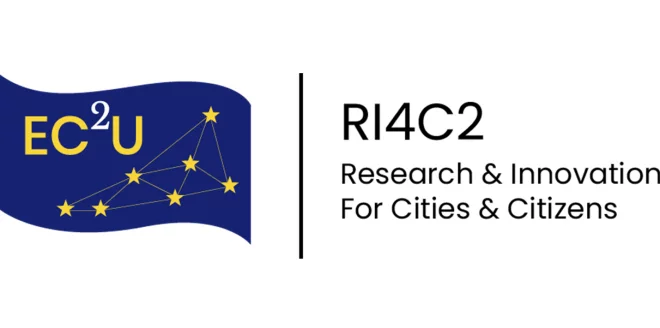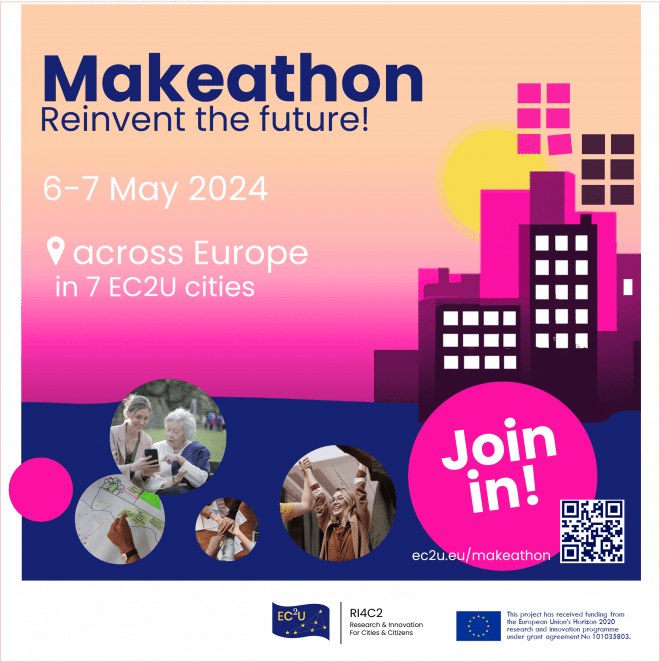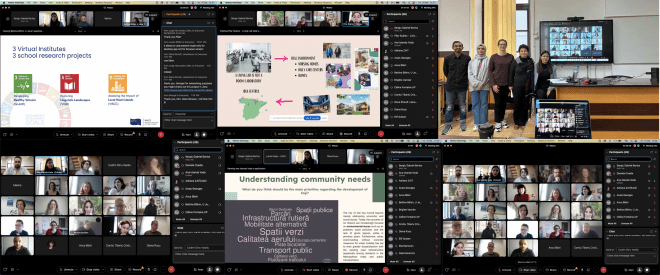RI4C2 – Research & Innovation For Cities & Citizens

The seven universities composing the European Universities Alliance “EC2U” are again joining forces to extend the activities of the EC2U Alliance to the Research and Innovation fields:
- University of Coimbra (Portugal)
- Alexandru Ioan Cuza University of Iaşi (Romania)
- University of Jena (Germany)
- University of Pavia (Italy)
- University of Poitiers (France)
- University of Salamanca (Spain)
- University of Turku (Finland)
The Horizon 2020 project: RI4C2 – “Research & Innovation For Cities & Citizens” is funded under the European Commission’s Horizon 2020 „Science with & for Society” call, Grant Agreement 101035803/04.06.2021.
In this project, the seven partners have the joint overall objective to create a shared Pan-European Knowledge Ecosystem (PEKE). The project will develop a process that involves a gradual and adaptative transformation of all aspects of the Research & Innovation (R&I) missions at the participant universities. This will include developing a research and innovation agenda and platform, offering workshops on the topic of people empowerment, and investigating which factors promote the development of a functioning knowledge ecosystem.
The objectives of the project are the following:
1) Developing a common R&I agenda and action plan
2) Strengthening human capital, enabling balanced brain circulation & gender balance
3) Sharing research infrastructures/resources
4) Reinforcing cooperation with non-academic actors
5) Mainstreaming Open Science
6) Promoting Citizen Science
7) Promoting cooperation among Alliances of European Universities
The project is based on eight work packages that act as “mini-engines” producing all components of the future PEKE and strengthening the local Knowledge ecosystems led by the participating universities:
- WP1 “Transformation management”, University of Poitiers (France)
- WP2 “EC2U R&I agenda”, University of Salamanca (Spain)
- WP3 “EC2U People empowerment”, University of Coimbra (Portugal)
- WP4 “EC2U R&I platforms”, University of Pavia (Italy)
- WP5 “EC2U Innovation sphere”, University of Jena (Germany)
- WP6 “EC2U Knowledge ecosystems”, Alexandru Ioan Cuza University of Iaşi (Romania)
- WP7 “Open EC2U”, University of Turku (Finland)
- WP8 “Transformation dissemination”, University of Poitiers (France)
Work Package 6. Knowledge Ecosystem
Coordinator: „Alexandru Ioan Cuza” University of Iasi
Work package description:
WP6 Board:
WP Leader: Prof.dr. Ionel Mangalagiu
Local Coordinators: Scientific responsible, Lecturer Ph.D. Habil. Ana Iolanda Vodă,
Elena Felice
1.WP1 “Transformation management”
2. WP2 “EC2U R&I agenda”
3. WP3 “EC2U People empowerment”
4. WP4 “EC2U R&I platforms”
5. WP5 “EC2U Innovation sphere”
- D5.1 – Virtual EC2U Innovation Lecture Series
- D5.3 – Lighthouses of Innovation part 1 Increasing Visibility
- D5.5 – Recipes of Innovation, part. 1
- D5.6 – Recipes of Innovaton, part II
6. WP6 “EC2U Knowledge ecosystems”
- D6.1 – Citizen Science Champions
- D6.2 – Vivid EC2U local Knowledge ecosystems
- D6.3 – Measuring civic engagement in R&I activities(1)
- D6.4 – Selection of relevant R&I topics for Citizen Science(1)
- D6.5 – Pilot Living Labs for Citizen Science
7. WP7 “Open EC2U”
8. WP8 “Transformation dissemination”
» Living Labs Launch- RI4C2 International Conference – 16.02.2024
GLADE Living Lab is part of the EC2U Virtual Institute for Good Health and Well-being (GLADE), developed to tackle specific approaches in education, research, innovation and service transfer to the community in the long run.
GLADE Virtual Institute will be the headquarters for:
- EC2U GLADE Literacy LAB and education for all in the area of good health and wellbeing;
- EC2U GLADE Transformative Research HUB;
- EC2U GLADE Management Service for a Healthy Campus and Online peer counselling LAB for students.
- LIFELINE master programme
For more information, check the GLADE Virtual Institute -UAIC web-page!
What is a Living Lab?
A Living Lab is an open innovation ecosystem in real-life environments using iterative feedback processes throughout a lifecycle approach of an innovation to create sustainable impact. (European Network of Living Labs)
To formulate a framework for the creation and development of the three pilot living labs within existing EC2U Virtual Institutes, the Living Labs-Pathways for Open Innovation Ecosystems conference was organized on 26.09.2023.
→ Conference presentations:
- Living Labs – challenges and opportunities for Citizen Science – Daniela Şoitu & Elida Rosenhech, “Alexandru Ioan Cuza” University of Iaşi
- Healthy Office Teststation exhibition – Lena Schmitz, University of Jena
Discover Living Labs in the areas of GLADE:
…. Glade LL is dedicated to preventing of health problems and promoting a healthy and active lifestyle.
…. The QC is a resource center dedicated to promoting health through lifestyle habits. It is also a building located in the Futuroscope area which includes a gymnasium, a teaching kitchen, a fitness room, training/meeting rooms, and innovative equipment. |
» Living Labs Launch- RI4C2 International Conference – 16.02.2024
QE Living Lab is part of the EC2U Virtual Institute for Quality Education (VIQE). The Virtual Institute develops activities that combines education, research and innovation for advanced studies in quality education.
What is a Living Lab?
Living Labs are open innovation ecosystems in real-life environments using iterative feedback processes throughout a lifecycle approach of an innovation to create sustainable impact. (European Network of Living Labs)
To formulate a framework for the creation and development of the three pilot living labs within existing EC2U Virtual Institutes, the Living Labs-Pathways for Open Innovation Ecosystems conference was organized on 26.09.2023.
→ Conference presentation:
- Contributions from the Gender Equality Unit to Citizen Science – Inmaculada Sánchez Barrios, University of Salamanca
|
Living Labs – University of Salamanca: ◊ Gendered Innovation Living Labs (GILL) builds on the Living Lab methodology by adopting a co-creation and co-design approach to develop mechanisms such as methodologies, services, and tools tested in real-life open ecosystems to increase Gender Responsive Smart Innovation and Entrepreneurship through a series of 15 pilot cases across 8 European countries. Our mechanisms focus on transforming individual, team, and organizational practice. ◊ Fablab USAL is a digital creation and fabrication laboratory focused on the prototyping of objects with digital technologies and open to the entire university community. ◊ Medialab USAL focuses on new ways of learning, fostering creativity and experimenting with digital technologies to promote social innovation. |
» Living Labs Launch- RI4C2 International Conference – 16.02.2024
SCC Living Lab is part of the EC2U Virtual Institute for Sustainable Cities and Communities (VISCC) which aims at bringing together research, education and innovation, and outreaching in the field of the United Nation’s sustainable development goal n°11: “Sustainable Cities and Communities”.
What is a Living Lab?
Living Labs are open innovation ecosystems in real-life environments using iterative feedback processes throughout a lifecycle approach of an innovation to create sustainable impact. (European Network of Living Labs)
To formulate a framework for the creation and development of the three pilot living labs within existing EC2U Virtual Institutes, the Living Labs-Pathways for Open Innovation Ecosystems conference was organized on 26.09.2023.
→ Conference presentation:
- Indoor Environmental Quality in School Buildings. Living Lab experiences in Coimbra University – Manuel Carlos Gameiro da Silva, University of Coimbra
|
Discover Living Lab in the areas of VISCC – University of Coimbra: • CENTRE FOR INDUSTRIAL ECOLOGY (CIE)/ CENTRO PARA A ECOLOGIA INDUSTRIAL (CIE) …. The CIE promotes scientific research, development and innovation to support industry, public authorities, organizations, and consumers towards sustainable production and consumption. The CIE takes a holistic and systematic approach to the analysis of sustainable systems by exploring trade-offs and synergies between economy, environment and society. |
In this policy brief, the European Universities pilot alliances report on the progress made in the development of a Pan-European Knowledge Ecosystem (PEKE), composed of a network of local KE of the RI4C2 Alliance’s partners and provide a first set of recommendations to the European Commission for further policy development.
» Follow-up – Virtual Lectures no. 7
Episode no. 7 of the Virtual Lecture Series, that was held on June 25th 2024, can be viewed on the EC2U Alliance Youtube webpage.
»Virtual Lectures (25.06.2024)
Avem deosebita plăcere de a vă invita la cea de-a 7-a ediție a prelegerilor virtuale „Virtual Lectures”, având ca temă inovația intangibilă, eveniment organizat în cadrul proiectului RI4C2.
Prelegerea va fi susținută în limba engleză și este deschisă publicului.
Când: 25 iunie 2024, la ora 13:00 CEST (14:00 Iași și Turku, 12:00 Coimbra)
Unde: accesând următorul link: https://uaic.webex.com/uaic/j.php
Mai multe informații găsiți aici: https://ec2u.eu/intangible-innovation-completes-the-virtual-lecture-series/
» Follow-up to the kick-off event of the EC2U Pan-European Knowledge Ecosystem!
On Tuesday, 11 and Wednesday, 12 June, the city of Poitiers (France) hosted the RI4C2 “Kick-off the EC2U Pan-European Knowledge Ecosystem – Unveiling the University of the Future” event. This significant gathering brought together participants both online and on-site, marking a key moment in the journey of the EC2U Alliance.
The programme not only presented the results of the RI4C2 project but also provided an outlook on future projects, focusing on the continuity and growth of research and innovation initiatives within the Alliance.
As we move forward, the activities and deliverables of the RI4C2 project will significantly contribute to the EC2U Alliance, ensuring the ongoing development and success of this Pan-European Knowledge Ecosystem.
More information: https://ec2u.eu/follow-up-to-the-kick-off-event-of-the-ec2u-pan-european-knowledge-ecosystem/
» Unveiling the University of the future: Kick-off the EC2U Pan-European Knowledge Ecosystem (11-12.06.2024)
The overall objective of the RI4C2 project (a 3-year project funded by the Horizon 2020 “Science with & for Society” – SwafS call for European Universities) is to extend the R&I activities of the EC2U Alliance and transform all aspects of its R&I missions. This will be achieved via the creation of a shared EC2U Pan-European Knowledge Ecosystem (PEKE).
This launch event will be the opportunity to take stock of the activities conducted during the 3 years of the project, but also to put forward their continuation within the EC2U Alliance and its future projects.
The launch of the EC2U PEKE will take place in the form of a 1.5-day hybrid event at the University of Poitiers and online on 11th & 12th of June, to which the whole EC2U community is warmly invited!
More information: Kick-off the EC2U Pan-European Knowledge Ecosystem
» Makeathon – Reinvent the future! (6-7.05.2024)
Soluția propusă de UAIC, cea mai apreciată de publicul care a participat la evenimentul EC2U Makeathon „Reinvent the future”.
Echipa care a reprezentat UAIC a fost formată din masteranzii Laurențiu Movilă (Facultatea de Chimie), Rareș Mocanu (Facultatea de Chimie), Alexandra Simon (Facultatea de Economie și Administrarea Afacerilor) și ACS dr. Sergiu Bortoș (Institutul de Cercetări Interdisciplinare – ICI UAIC). Provocarea locală aleasă a fost eficientizarea transportului în municipiul Iași pentru creșterea calității vieții. Soluția „Teleportation – engage”, propusă de echipa ieșeană, a constat în dezvoltarea unei aplicații mobile bazată pe un sistem de recompense (puncte bonus ce ar putea fi obținute pentru mersul pe jos, utilizarea bicicletei sau a transportului în comun, care să poată fi transformate în tarife reduse la biletele și abonamentele de transport public, oferte la o selecție de magazine, acces gratuit la evenimente culturale etc.), care promovează utilizarea transportului alternativ. Astfel, propunerea vizează implicarea atât a cetățenilor, a agenților economici cât și a administrației locale.
Informații suplimentare: Teleportation-Engage-EC2U Makeathon
Provocări propuse pentru orașul Iași:
- Sănătate și bunăstare
- Cum putem găsi soluții de transport mai bune, pentru a decongestiona traficul, a reduce timpul petrecut în trafic, a reduce poluarea? (Echipa RI4C2 WP5 Iași)
- Natura și sustenabilitate:
- Cum am putea noi, ca cetățeni, să extindem și să protejăm zonele verzi din jurul orașului – parcuri, străzi, locuri de muncă, casă proprie? Cum putem educa oamenii să iubească și să protejeze natura, să o păstreze curată și frumoasă? (Civica + Echipa RI4C2 WP5 Iași)
- Cum putem găsi cele mai bune soluții de regenerare urbană – pentru clădiri industriale vechi, pentru zonele mai sărace din apropierea orașului, pentru blocuri vechi urâte? (Iulius Group)
- Pace și democrație
- Cum putem crește participarea civică, pentru toate problemele orașului? Cum putem educa cetățenii să fie activi, să ridice întrebări, să sugerăm soluții pentru provocările orașului? (Civica)
Provocări europene propuse pentru echipele online:
- Sănătate și bunăstare
- Cum poate fi luată în considerare mai bine sănătatea mintală a tinerilor? (Europe Direct, Info Jeunes Nouvelle Aquitaine, Poitiers, France)
- Cum poate fi încorporată activitatea fizică într-o abordare generală de promovare a sănătății și să fie integrată în toate spațiile de locuit? (Chaire Sport Santé, Poitiers, France)
- Diversitate și incluziune:
- Cum am putea aduce împreună oameni de vârste și medii diferite într-un mod care să sporească solidaritatea și incluziunea? Ar putea fi soluții digitale sau materiale. (Turku, Finland)
- În contextul alegerilor europene, cum poate fi facilitat accesul la vot pentru europenii cu dizabilități? (Europe Direct, Info Jeunes Nouvelle Aquitaine, Poitiers, France)
- Pace și democrație:
- Cum am putea noi, ca cetățeni, să promovăm consolidarea păcii prin mesaje pozitive în cadrul comunităților? Concentrându-ne pe arta stradală ca mijloc de exprimare, cum putem noi împreună cu artiștii și cetățenii locali să creăm un mediu propice dialogului constructiv și schimbării sociale? (EC2U Echipa Think Tank, Poitiers, France)
- Cum am putea folosi platformele digitale și gamification pentru a revoluționa educația civică, făcând-o mai captivantă și cu impact pentru tineri? (ELEVA Digital Development Agency, Pavia, Italy)
- Cum am putea crește cetățenia europeană și sentimentul de apartenență la UE în rândul comunității studențești EC2U? Ce acțiuni concrete, inițiative și soluții creative am putea proiecta ca alianță pentru a ne aduce contribuția la această problemă crucială pentru viața democratică și participativă a UE? (International Mobility unit – University of Pavia, Italy)
Participanți: studenți, elevi, cetățeni, angajați, antreprenori și alții care se implică activ în Makeathon pentru a rezolva o provocare în mod creativ.
Provocatori: organizații, companii sau persoane care propun provocări specifice pe care participanții să le abordeze în timpul Makeathon. Ei definesc problemele, obiectivele și cerințele provocărilor, oferind participanților un subiect clar pentru dezvoltarea soluției lor.
Mentori și arbitri: experți sau profesioniști cu cunoștințe de specialitate care oferă îndrumări, feedback și sfaturi participanților, ajutându-i să-și perfecționeze ideile și să treacă prin provocări.
Când: 6-7 Mai 2024
Unde: In toată Europa, în Coimbra, Iași, Jena, Pavia, Poitiers, Salamanca, Turku și online.
- în Iași, se va desfășura la Universitatea „Alexandru Ioan Cuza” din Iași, sala Senat, Corp A.
Mai multe informații despre eveniment aici: https://ec2u.eu/news/makeathon/
» Highlights from the RI4C2 Project Annual Meeting, March 2024
- From the 12th to the 14th of March, the University of Salamanca served as the vibrant host for the Annual Meeting of the RI4C2 – Research & Innovation for Cities & Citizens project. This gathering marked a pivotal moment in advancing the collective efforts of the EC2U Alliance to enhance Research and Innovation activities within its member universities.
- From Romania ( University Alexandru Ioan Cuza of Iasi), the Local Coordinator Lecturer Ph.D. Habil. Ana Iolanda Vodă attended this meeting togheter with aur team member Sergiu Bortos.
» Living Labs Launch- RI4C2 International Conference – 16.02.2024
The Living Labs for Cities and Citizens – RI4C2 International Conference aims to launch the three Pilot Living Labs within existing EC2U Virtual Institutes (EC2U VI), whose virtual structures are defined on the basis of three United Nations Sustainable Development Goals (SDGs): Good health and wellbeing (VI GLADE) (SDG #3); Quality Education (VI QE) (SDG #4) and Sustainable Cities and Communities (VI SCC) (SDG #11).
- Time frame: 10.00-13.45 CET (9.00-12.45 Coimbra, 11.00-14.45 Turku and Iași)
→ Press release(.pdf)
→ The meeting link for online participants: https://uaic.webex.com/uaic/j.php?MTID=mec031ed95329df1db5774a19e7d0c317
» Lansare Living Labs (Laboratoare Vii) – Conferință Internațională RI4C2
Conferința Internațională RI4C2 cu tema Laboratoare Vii (Living Labs) pentru Orașe și Cetățeni, are scopul de a lansa trei programe pilot de tip Living Lab (Laborator Viu) în cadrul Institutelor Virtuale EC2U (EC2U VI) deja existente, a căror structuri virtuale sunt definite pe baza a trei obiective de dezvoltare sustenabile ONU: Sănătate și Bunăstare (VI GLADE) (SDG #3), Educație de Calitate (VI QE) (SDG #4) și Orașe și Comunități Sustenabile (VI SCC) (SDG #11).
- Program: 11.00-14.45
→ Comunicat de presă (.pdf)
→ Program
→ Pentru participații online: https://uaic.webex.com/uaic/j.php?MTID=mec031ed95329df1db5774a19e7d0c317
» Living Labs-Pathways for Open Innovation Ecosystems – RI4C2 Conference – 26.09.2023
The aim of the conference is to formulate a framework for creating and development of the three Pilot living labs within existing EC2U Virtual Institutes.
» 6th EC2U Forum in Jena, on 22-25 May 2023
→ Research and innovation for cities and citizens (RI4C2) (.pdf)
Work Package 6 Board:
WP6 Leader: Prof.dr. Ionel Mangalagiu, ionelm@uaic.ro
Local Coordinators:
- Scientific responsible, Lecturer Ph.D. Habil. Ana Iolanda Vodă, ana.voda@uaic.ro
- Elena Felice, eradu@uaic.ro
Address:
University „Alexandru Ioan Cuza” of Iasi
Boulevard Carol I, No.11, Iaşi, România,








